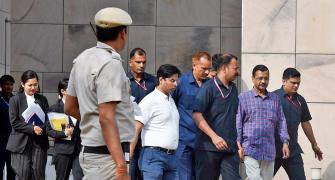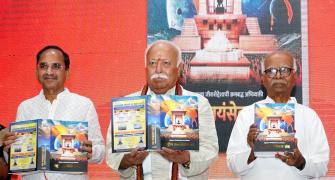In a major setback to recent Sino-Indian bonhomie, the official Chinese media on Thursday criticised the historic Indo-US civilian deal, saying it smacked of 'double standards' in the global efforts to rein in nuclear proliferation.
"While many blame the Democratic People's Republic of Korea and Iran for frustrating international efforts on nuclear non-proliferation, the double-standards adopted by some Western countries on nuclear issues could also be said to add to the problem, for their stance has undermined the authority of the Nuclear Non-Proliferation Treaty," the state-run Xinhua news agency said.
While these two states drew much criticism for running contrary to nuclear non-proliferation, the 'double standards' on nuclear issues by some Western countries also fuelled worries among the international community over the spread of weapons of mass destruction.
In September, the annual conference of the International Atomic Energy Agency blocked a motion by some 20 countries -- including 15 Arab nations -- to call on Israel to give up its ambition of possessing nuclear weapons, and become a signatory to the NPT.
"The double standards are manifested in another case -- India, a country which has detonated nuclear bombs but refused to sign the NPT," the 2006 Xinhua yearender on non-proliferation noted.
It pointed out that US President George W Bush agreed in March 2006 on a nuclear civil cooperation deal under which New Delhi is allowed to buy foreign nuclear technology for the first time in 30 years.
"These double standards would inevitably diminish the NPT's authority among countries that have not acquired nuclear weapons," it commented amid New Delhi's claim that Beijing has endorsed the Indo-US civilian nuclear deal during Chinese President Hu Jintao's recent state visit to India.
The worries are, apart from the existing nuclear powers, some 30 countries have also acquired relatively advanced nuclear technologies.
They have the capacity needed to develop nuclear weapons once free from the rein of the international non-proliferation mechanisms, the commentary said.
External Affairs Minister Pranab Mukherjee had recently said in a television interview that China has endorsed the India-US civilian nuclear deal.
Asked how Beijing viewed the agreement, Mukherjee said, "China has endorsed it."
The India-US deal reverses decades of US anti-proliferation policy by allowing civilian nuclear trade with India in exchange for Indian safeguards and inspections at its 14 civilian nuclear plants. Eight Indian military plants would be off-limits to inspectors.
India must get an exception from the Nuclear Suppliers Group, of which China is a member. During past meetings of the NSG, China had questioned the Indo-US nuclear deal.
In the past, many Chinese scholars and the ruling Communist Party's official mouthpiece, the People's Daily, had criticised the Indo-US nuclear deal, saying that it will undermine global disarmament efforts.
The reports said that Washington was also trying to woo New Delhi to counter-balance Beijing's rise as a big power.







